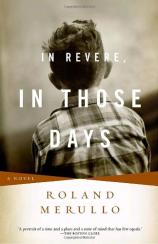Reading Group Guide
Discussion Questions
In Revere, In Those Days

1. How did Tonio's mother and father show their love for their son? How did Tonio's grandmother express her love, and how does he distinguish her love from that of the other members of his family: his grandfather, his uncle, and his aunt?
2. Tonio uses the term "provincial" to describe the Revere of his youth [p. 6]. Is this description applicable to the modern Revere? How has Revere changed since Tonio's youth, and how are these changes representative of a changing America?
3. In many ways, Tonio's story is the story of Uncle Peter. What portrait of the ex-boxer emerges from the novel? Is Uncle Peter a hero or a failure? How does Tonio support his assertion that Uncle Peter is "short on logic, long on heart" [p. 83]?
4. In an effort to make sense of his Uncle Peter's appearance and lifestyle, Tonio postulates that Uncle Peter wanted the "world [to] see us as we saw each other—as dazzling souls" [p. 45]. What does Tonio mean? How does Tonio's explanation simultaneously uphold and break down the Italian immigrant stereotype?
5. With respect to the mob's place in Italian-American culture, Tonio writes: "I don't much appreciate the fact that, to this day, the Italian-American way of life has been reduced to a television cliché: thugs with pinkie rings slurping spaghetti and talking tough. My story has nothing to do with that cliché. Almost nothing" [p. 8]. How does the existence of the mob lurk between the lines of Tonio's story and how did it affect his life, directly or indirectly? What is Uncle Peter's relationship with the mob? How does it affect Tonio's feelings about Uncle Peter? The reader's feelings about Uncle Peter?
6. Tonio says, "Coincidence, fate, karma, luck, the mood swings of a merciful God—it fascinates me now to listen to the ways we explain life to ourselves and each other" [p. 17]. Which of these terms would Tonio use to explain life? What about Grandpa Dom? Uncle Peter? Rosalie?
7. Tonio alludes to Grandpa Dom's "idea" for him [p. 81] before he actually reveals it later [p. 97]. Where else does Merullo use this technique of foreshadowing and is it effective in propelling the story along? Why else might Merullo have chosen to employ this technique?
8. What "truth" does Tonio's grandmother know, and does he ever approach possessing knowledge of this "truth" [p. 62]?
9. How does Tonio's life story echo Grandpa Dom's story about his sister Eleonora that he relays to Tonio on the beach [pp. 66-76]? How does Grandpa Dom's story help explain Tonio's motive in writing his memoir?
10. What motivates Rosalie to imitate Tonio's late parents at the New Year's party [p. 94]?
11. What holds the Benedetto family together? Is it the mere fact that they are blood relations or is it the consequence of the actions of certain family members [p. 86]? What does Uncle Peter mean when he tells Tonio that "the whole family's gonna change" when Grandpa Dom passes away [p. 260]?
12. Tonio states: "Now, in middle age, the pendulum has swung back. I find myself drawn to old friends in Revere and tugged away from some of the people I know in the wider world" [p. 157]. Why might Tonio feel this way? How did Tonio's experiences at Exeter affect his relationship with and connection to his family? Having achieved success, what might the adult Tonio be looking for in Revere, and is whatever he is looking for still there?
13. Tonio implicitly measures his life against Rosalie's life [p. 102], but Grandpa Dom, even as he is dying, says to Tonio: "Your cousin has her own life. . . . A separate life from you" [p. 263]. How does Tonio try to make sense of Rosalie's life through the psychology of "self-hatred" [pp. 105, 227]? If Tonio's life is compared to Rosalie's, must the reader conclude that one can control his own destiny? Does Tonio's family succeed with Tonio but apparently fail with Rosalie?
14. The narration alternates between the point of view of a young, more naïve, Tonio—who often possesses only partial knowledge of the facts (such as the child who discovers his Aunt Ulla cheating on Uncle Peter [pp. 118-9])—and that of the adult Tonio looking back on his childhood with more complete knowledge of the facts. How reliable is Tonio as a narrator throughout the novel, and how does his reliability affect the reader? How else might Tonio's narrative voice be described? What balance does the narrator strike between nostalgia and factual analysis?
15. How is the process of grief, mourning and recovery different for a child than for the adults in the story, such as Uncle Peter or Lydia? Why does Tonio feel in the days after he received the scholarship from Exeter that "in some way I could not fathom, my parents' death had begun to hurt me more instead of less, as if, as my body changed, the sadness had spawned offspring in my cells—an ancestry of absence, a genealogy of grief" [pp. 150-1]? How do Tonio and Lydia each find solace in solitude [p. 230]? What does Lydia teach Tonio about himself and grief that his family cannot?
16. Tonio expresses fond memories for Saint Anthony's Church, the Catholic church of his youth [p. 123], but what are his actual religious beliefs? Does he believe in a God? Tonio describes the connection he had with Lydia as follows: "An appreciation for the magnitude of absence. The absence of a person you loved, the absence of a Creator's mercy" [p. 245]. What does this observation reveal about Tonio's religious convictions?
17. At his grandfather's funeral, watching mobster Angelo Pestudo make his condolences, Tonio writes, "I made a little vow to myself, as to how I would try to live. . . . I made myself a little promise" [p. 276]. What is the promise Tonio made to himself? Did he keep it?
In Revere, In Those Days
- Publication Date: October 14, 2003
- Paperback: 320 pages
- Publisher: Vintage
- ISBN-10: 0375714057
- ISBN-13: 9780375714054








